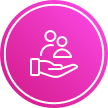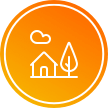
Bowery Residents Committee Inc
BRC offers a hand UP towards health & self-sufficiency to those reclaiming their lives from homelessness, mental illness, and addiction.
We support our clients with an array of services and programs including street and transit outreach for the unsheltered homeless, substance abuse recovery, health and mental health support, temporary housing and shelter, employment training, permanent housing, and senior support.
Financials
Programs
Workforce Development
BRC Horizons Workforce Development program helps residents of BRC’s shelters overcome obstacles to employment so they can be effective job seekers and valued employees, enabling them to find and maintain lasting self-sufficiency and stability through employment.
Nearly three-quarters of Horizons clients face one or more challenges relating to a limited education, history of criminal justice involvement, mental health and/or substance abuse disorder, or chronic medical conditions.
Through group workshops, individual counseling and ongoing job retention support, Horizons instills homeless men and women with the tools to find and keep a job today and in the future.
Art Therapy & Mental Health Services
Integrated in BRC programs, BRC’s Art Therapy Program provides clients the opportunity to reduce stress, develop self-awareness and build self-esteem through creativity.
The hands-on process of creating art, allows clients to cultivate a deeper understanding of, and empathy towards, others while gaining insight into problem areas in their lives. Art therapy helps people work through painful emotions and makes meaning of experiences that are difficult to articulate.
Nearly half of the homeless men and women BRC serves have a chronic mental health challenge to manage as well.
To help meet their needs, we provide comprehensive mental health support and treatment throughout our programs, with a special focus on serving clients who are severely and persistently mentally ill (SPMI), many of whom have co-occurring substance abuse problems.
Outreach to the Unsheltered
BRC’s outreach teams navigate the city and connect with our clients where they live — in the transit system and on the streets. They start conversations and build long-term relationships based on mutual respect and trust. They listen and then act, providing our clients with the assistance they need through placements in any number of our programs located throughout the city or in similar programs offered by other providers. In this way, those sometimes deemed “service-resistant” are able to get the help they need.
Transitional Housing & Shelter
We have 14 transitional housing programs with a goal to provide shelter and the resources needed to overcome challenges and find permanent housing.
Each of these programs has a primary focus – such as mental illness, addiction, or employment – but takes a holistic approach to meeting the totality of a client’s needs.
We work with our clients and assist them as they perform these tasks for themselves. This improves the odds of their long term success once they leave BRC.
Permanent Housing
Finding and keeping an affordable home is a challenge for any New Yorker, especially for those with limited incomes, health challenges and disabilities, and limited histories of stable tenancy. With demand outstripping supply, our clients have few options.
So to improve the odds for the people we serve, BRC became a benevolent developer and manager of housing to meet their needs, creating caring and supportive communities.
Today, over 550 households call BRC their permanent home: single adults and families with children, most previously homeless but some also needing an affordable home to avoid homelessness. They have leases and pay rents they can afford; and if a crisis occurs, we understand, and we help.
Substance Abuse Treatment
BRC was founded by a group of recovering alcoholics seeking to improve their living conditions. We know well that substance abuse is one of the most common and most challenging barriers to health and housing stability.
BRC's in- and outpatient substance abuse treatment programs address the complex needs of homeless people with substance abuse disorders and advanced chemical addiction.
BRC's two addiction treatment programs, licensed by NY State and located at our West 25th Street location, meet the recovery needs of over 2,600 men and women each year.




